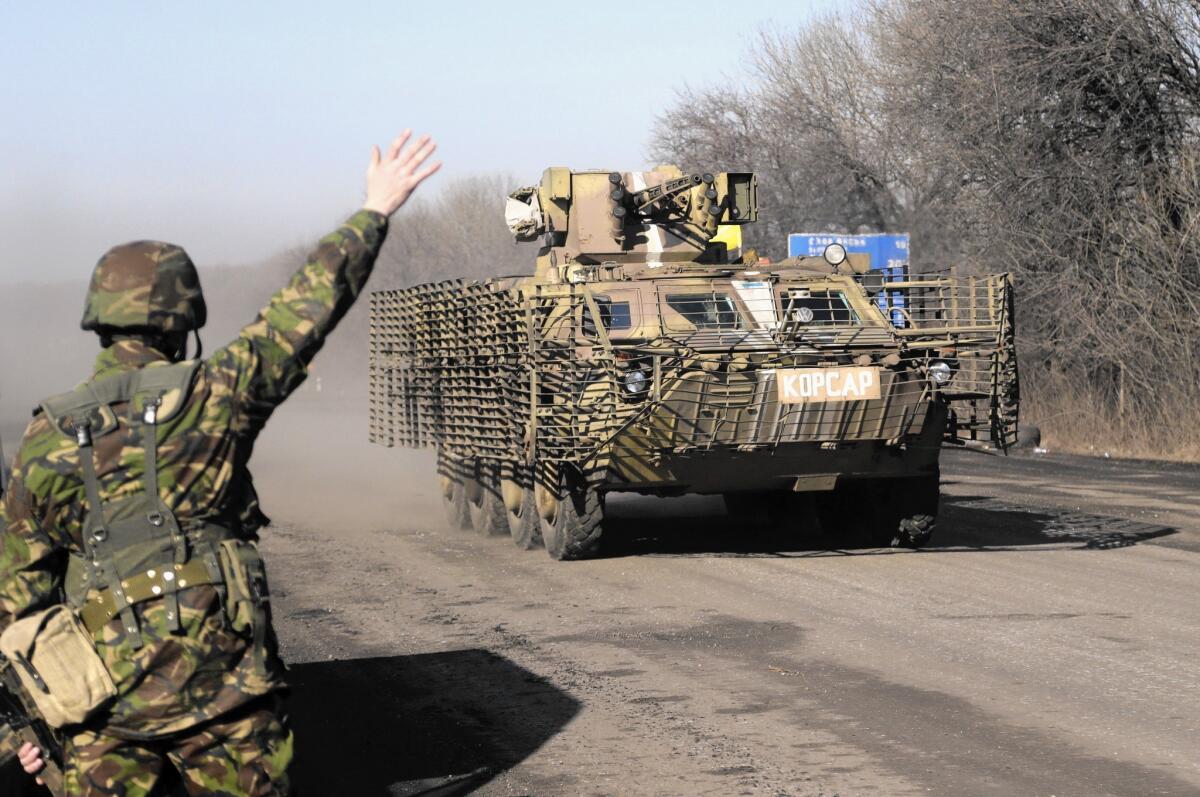Hands-off strategy in Ukraine spurs critics of Obama’s foreign policy

- Share via
Reporting from Washington — U.S. officials led the negotiations that ended European wars in Bosnia, Kosovo and Georgia in recent decades, just as they guided the talks in 1945 that ended World War II.
But when the leaders of Germany, France, Russia and Ukraine held a marathon negotiation this week in the Belarus capital of Minsk to try to halt the fighting in eastern Ukraine, U.S. officials were not in the room.
Their absence has become another aspect of a roiling debate over President Obama’s foreign policy.
The decision to not attend the talks “is striking — it’s stunning,” said Eugene Rumer, a former U.S. intelligence official and Russia specialist who is now at the Carnegie Endowment for International Peace in Washington.
Administration officials cite two reasons for their absence from Minsk. They don’t want the conflict to appear to be a Cold War-style, U.S.-Russian confrontation, which would support Russian President Vladimir Putin’s claim that Washington has fomented the Ukraine struggle to draw Kiev into the Western security orbit.
Second, the White House wants European nations, which continue to cut spending for defense, to take the lead in resolving what the White House considers foremost a European security problem.
The approach has drawn criticism not only from Republican adversaries, but also from ranking figures in the Democratic foreign policy establishment, who are pushing ever harder for the White House to do more to stop what they consider the biggest threat to European security since the Cold War.
The split was clear this month, when a group of former senior members of the Obama and Clinton administrations, among others, called on Obama to begin sending weapons and ammunition to Kiev to help government forces fight the Russia-backed separatists in eastern Ukraine.
In the 10 months since the conflict began, the White House has imposed economic sanctions on Russia and given humanitarian aid and economic support to the nearly insolvent government in Kiev.
The urgency of the crisis was apparent Friday as fighting raged before the Sunday cease-fire deadline.
Separatists intensified efforts to capture the key railroad junction of Debaltseve from Ukrainian forces, pounding the city with heavy artillery barrages. At least 25 people were reported killed.
The upsurge in fighting and casualties reflected a last ditch effort to take or recover territory before all guns are supposed to fall silent at 12:01 a.m. Sunday.
Ukrainian officials have accused Russia of sending reinforcements to the separatists in recent days, including a convoy of 70 armored personnel vehicles and mounted guns. A senior Ukrainian military official, Petro Mekhed, told reporters that Moscow had deployed at least 10,000 soldiers to the conflict.
Putin has repeatedly denied sending troops or weapons, despite NATO satellite surveillance photos showing armored columns crossing from Russia into Ukraine. Putin has said only “volunteers” from Russia have gone to aid the separatists.
Putin and Ukrainian President Petro Poroshenko negotiated with German Chancellor Angela Merkel and French President Francois Hollande for 16 hours Wednesday and Thursday to craft the cease-fire deal. The truce sets out the same timetable and disarmament objectives outlined in a Sept. 5 peace accord that the warring factions then promised to fulfill but didn’t.
Under the new plan, heavy weapons and foreign fighters should be withdrawn within two weeks after the cease-fire starts, and elections should be held under Ukrainian law in separatist-held regions, which are supposed to be granted more autonomy by the Ukrainian parliament by the end of the year.
Administration officials in Washington insist they are deeply involved in the Ukraine diplomacy. They say they spoke by phone to European leaders during the talks this week. And Obama conferred with Merkel, the German leader, Monday at the White House.
“It would be inappropriate or a misperception to say we have not been in the game,” a senior administration official told reporters Thursday.
Yet administration officials also made clear in statements and a new national security blueprint that they want America’s partners in Europe to do more heavy lifting, and that they believe warnings about Russia’s intentions are overblown.
National Security Advisor Susan Rice, discussing the strategy in a speech Feb. 6, said Americans are being “buffeted by alarmism.” Current security threats, while serious, are not “existential” like those from the Soviet Union or Nazi Germany, she said.
Administration insiders also argue that there’s little point in Obama spending time trying to influence Putin in a dispute in which the Russian leader has shown no willingness to compromise. With crises around the world, and limited time left in his term, Obama should focus on priorities such as completing a nuclear deal with Iran, or the opening to Cuba, which could contribute to his legacy, they say.
Obama has sharply reduced contact with Putin. Their last meeting was a brief encounter in November in Beijing. White House officials say Obama’s phone call to Putin on Feb. 6 was their first since August.
The four-country meeting in Minsk followed a pattern that began in June. Putin appears to like the so-called Normandy format because it doesn’t give a seat at the table to the European Union, which includes the Russophobic Baltic states and Poland.
U.S. officials say they are satisfied with the approach. Some European diplomats say they’re not sure the Americans would want to sit at the table if asked.
“We have clearly outsourced this to the Europeans,” said Heather Conley, a former State Department official now at the Center for Strategic and International Studies in Washington.
Richter reported from Washington and Williams from Los Angeles.
More to Read
Sign up for Essential California
The most important California stories and recommendations in your inbox every morning.
You may occasionally receive promotional content from the Los Angeles Times.















